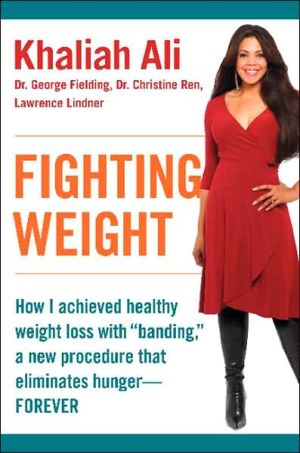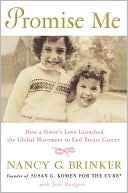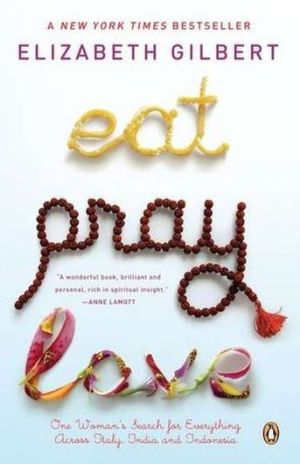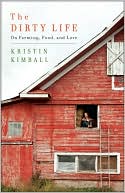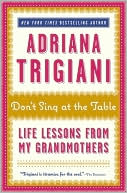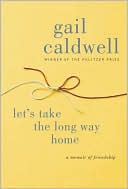Fighting Weight: How I Found Healthy Weight Loss with Banding, a New Procedure that Eliminates Hunger--Forever
"It was more than that I had kissed away my twenties and was miserable. I couldn't be naked with anybody, couldn't wear a backless dress, couldn't go to the beach—all the things a person should be able to do."\ hen Muhammad Ali's daughter Khaliah hit 325 pounds, she didn't need to be told again that she was morbidly obese. A lifetime of dieting, of starving, had not helped. She thought about gastric bypass surgery but couldn't pursue it after reading the statistic that as many as one in...
Search in google:
"It was more than that I had kissed away my twenties and was miserable. I couldn't be naked with anybody, couldn't wear a backless dress, couldn't go to the beach—all the things a person should be able to do." hen Muhammad Ali's daughter Khaliah hit 325 pounds, she didn't need to be told again that she was morbidly obese. A lifetime of dieting, of starving, had not helped. She thought about gastric bypass surgery but couldn't pursue it after reading the statistic that as many as one in twenty-five people suffers complications, and sometimes death, from the operation. She could not afford to risk leaving her young son without a mother. Miserable, depressed, and unable to walk up a flight of stairs without losing her breath, she did not know which way to turn—until a friend pointed her toward a new type of surgery called gastric banding. It is just as effective as gastric bypass with a fraction of potential complications. With the band placed around her stomach and completely taking away her hunger, Khaliah slimmed down to half her former size. The band she used has been the surgical option of choice in Europe for more than a decade but is only just now arriving in the United States. It is sure to become number one here too. Unlike gastric bypass surgery, gastric banding is reversible, is completely safe during pregnancy, involves no nutritional deficiencies, and best of all, takes away hunger forever, not just for the first year or so. Khaliah wraps her story of weight loss in this memoir of what it was like to grow up the daughter of one of the world's most famous men, and teams up with her surgeons at the New York University Medical Center to detail the lifetime of misery suffered by an obese girl; the ins and outs of the banding operation; and the joy, serenity, and health resulting from a solution that until now had eluded her. Publishers Weekly Khaliah, daughter of Mohammad Ali, struggled with obesity for most of her life. With a father famous for his athletic abilities (and one sister following in his footsteps) Khaliah felt insecure about her weight. She tried many diets and weight-loss programs, but hunger always got the best of her. At her heaviest, she reached 325 pounds, and even with diet and exercise couldn't seem to get below 220. Khaliah decided to try "laparoscopic banding"-a surgery this book claims has less risk, less recovery time and better results than gastric bypass. With the help of the band (which is wrapped around the stomach), Khaliah was finally able to lose the weight and step out of her shell. Khaliah is a likable person on the page; she seems to genuinely want to help others get results. The sections written by her doctors explain the mechanics of the surgery, who should or should not have it and what to expect if you do. The audience of the book is clearly limited to those curious about the surgery or at least in the market for a way to lose a large amount of weight. (June)Copyright 2007 Reed Business Information
Fighting Weight\ How I Achieved Healthy Weight Loss with "Banding," a New Procedure That Eliminates Hunger--Forever \ Chapter One\ "Blubbery"\ \ Re-united and it feels so good\ Re-united 'cause we understood\ There's one perfect fit\ And, sugar, this one is it . . .\ \ Peaches & Herb's number-one hit was wafting over from the radio on the kitchen windowsill. I had just turned five, the trees had all leafed out for early summer, and I was sitting with my best friend, Teddy, on the deck behind the house on Philadelphia's Main Line that my father had bought for my mother and me not long before.\ It was one of those perfect childhood moments that you can count on one hand. Both Teddy and I had fathers we didn't always get to be with (his was Teddy Pendergrass), but our mothers were very close, to the point that I often called his mom not simply my aunt but Mama Rose, and he called mine Mama Aaisha.\ Many days we'd all pile into the car and go to the beach together, with Teddy and me nodding off on each other's shoulders during the ride back home from the Jersey shore and then being plopped onto a big bed. Some nights, one of our mothers would get a bushel of crabs, and we'd eat, dance to oldies, watch television, then sit up late and talk. For a year or so Teddy and I took the same school bus, and once he and his friends handcuffed me to a bench for a prank, with the bus company having to call the police to unhitch me. When we'd have sleepovers, I used to snore, and he would hold my lips shut until I couldn't breathe and would wake up. We truly loved and teased each other like brother and sister.My mother and I even lived at Teddy Pendergrass's home for several months one year when our pipes burst and the house flooded and then took forever to fix.\ So when we were all together and our mothers were happy, as they were that summer day, I felt enveloped in that blissful note of security that only a child can feel wrapped in so warmly.\ Our mothers had just finished barbecuing steaks on the grill. I was happily chewing my heart out, particularly because my own mother had recently given in to my grandmother and stopped trying to raise me on a strictly vegan diet, without any meat or dairy. This was one steak I didn't have to sneak on Grandmom's watch.\ I especially loved the meat right by the gristle, where it tasted saltier and juicier. My soul was literally swaying to my eating, to the air that hadn't yet turned too humid, to the music . . .\ \ As we reminisce\ On precious moments like this\ I'm glad we're back together—\ \ "That's why you're so blubbery. Because you eat all that blubbery steak."\ Teddy jolted me from my reverie, and from much else. It was the first time someone had so bluntly made me feel there was something unacceptable about me.\ Suddenly I felt conscious of my bare arms poking through my favorite sleeveless sundress, the heat rising to my face. I put down my fork.\ In truth, my weight as a topic wasn't entirely new to me. My mother had already begun to show concern.\ Part of it was that were we built so differently. My mother, like her sister and all her cousins, had a lithe frame and was petite. But I was built big, like my father's side, and looked a lot like him and his mother, whom everyone called Mama Bird and who was quite heavy. In fact, the day I was born—Father's Day, 1974—my father took one look at me and said, "Oh my God, she's a Little Bird." It became my nickname as well as my legacy. Even by the time I was two or three, I was a chunkier child than others, and I was clearly chubby by the time I hit kindergarten.\ It wasn't just my weight that alarmed my mother; it was my height. I was so tall for my age, to the point that by the time I reached first grade, my feet were bigger than hers. I couldn't fit into her shoes, the way little girls like to do when playing pretend dress-up. And I think that fueled the "Oh my God, she's big" notion. My mother just didn't understand my body.\ My weight and size were not the only things that concerned her. Although quite thin by the time I was born, she had been a very chubby child with Coke-bottle glasses, praised for her braininess but not her looks. All that changed, however, when she came down with rheumatic fever at age thirteen and was sick in bed for the better part of a year. She lost a lot of weight as a result of the disease, learned to compensate without her glasses, and literally emerged from the illness radiant. Overnight, so to speak, she turned into a swan that garnered a lot of attention for her looks. And having learned firsthand the value of attractiveness—it was much of what initially drew my father to her, after all—she feared my missing out on that asset, as she had earlier in life.\ So she dieted me, as she was constantly dieting herself, eating tiny portions and exercising excessively. In fact, I feel pretty confident that my mother's vegan phase was, at least in part, an effort to control her weight.\ She didn't actually put me on structured calorie-controlled plans, at least not early on, but she was always making an effort to limit the amount I ate. I remember lots of negotiating, coupled with lots of "getting caught."\ "You can have two Girl Scout cookies."\ "Okay, Mom."\ Then she'd walk out of the room, and I'd take a handful—nothing will make you eat more than being told you can't. When she came back in, she'd say, predictably, "You ate these."\ "No, I didn't."\ "Yes, you did. I counted them. You're going to get fat."\ Fighting Weight\ How I Achieved Healthy Weight Loss with "Banding," a New Procedure That Eliminates Hunger--Forever. Copyright © by Khaliah Ali. Reprinted by permission of HarperCollins Publishers, Inc. All rights reserved. Available now wherever books are sold.
\ Publishers WeeklyKhaliah, daughter of Mohammad Ali, struggled with obesity for most of her life. With a father famous for his athletic abilities (and one sister following in his footsteps) Khaliah felt insecure about her weight. She tried many diets and weight-loss programs, but hunger always got the best of her. At her heaviest, she reached 325 pounds, and even with diet and exercise couldn't seem to get below 220. Khaliah decided to try "laparoscopic banding"-a surgery this book claims has less risk, less recovery time and better results than gastric bypass. With the help of the band (which is wrapped around the stomach), Khaliah was finally able to lose the weight and step out of her shell. Khaliah is a likable person on the page; she seems to genuinely want to help others get results. The sections written by her doctors explain the mechanics of the surgery, who should or should not have it and what to expect if you do. The audience of the book is clearly limited to those curious about the surgery or at least in the market for a way to lose a large amount of weight. (June)\ Copyright 2007 Reed Business Information\ \ \ \ \ Library JournalWith the rise in obesity in America, bariatric surgery is becoming more common, even among children. Gastric banding, a less drastic alternative to the better-known gastric bypass, was approved in the United States in 2001, after being developed in Europe and Australia. Ali, daughter of Muhammad Ali and a well-known philanthropist and talk-show host, describes her own lifelong battle with obesity and the effect of her own gastric-banding surgery, the subject of a feature on the Today Show. Coauthor George Fielding, M.D., who performed Ali's surgery, explains the process and how it differs from other bariatric surgeries: a band is put around the area where the esophagus meets the stomach; the band, which affects the sensation of hunger, can be loosened, tightened, or even removed entirely. Regular foods can be eaten, and no nutritional supplements are necessary. A good combination of scientific information and personal narrative, this title belongs in all public libraries.\ —Susan B. Hagloch\ \ \
